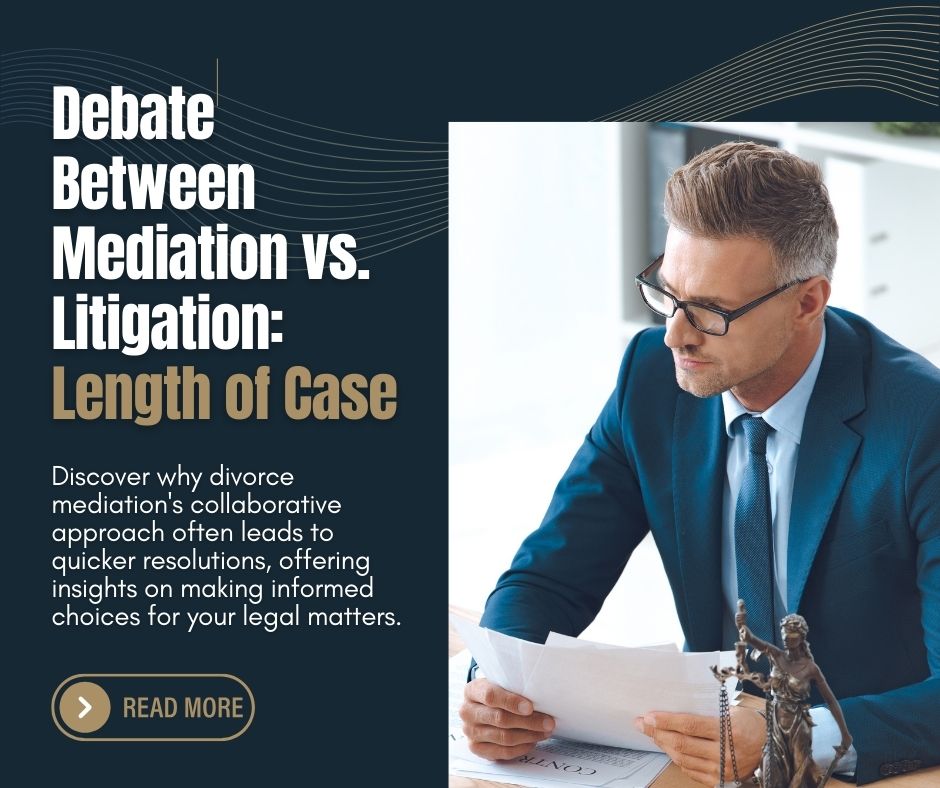In the realm of dispute resolution, the choice between mediation and litigation significantly impacts the length of a case. Mediation, as a refreshing alternative to the traditional adversarial approach of litigation, particularly shines in its efficiency in expediting the resolution process. Let’s delve into why divorce mediation tends to outshine litigation in terms of the case length, especially in San Diego.

Collaborative Nature of Mediation
Mediation is inherently a collaborative process involving a neutral third party, the mediator, who facilitates communication and negotiation. In contrast to the lengthy court procedures associated with litigation, divorce mediation in San Diego encourages a streamlined and focused discussion on resolving underlying issues. Active participation by the involved parties leads to quicker resolutions, a hallmark of the collaborative nature of mediation.
Flexible Timelines in Mediation
Litigation is often bound by rigid court schedules and procedures, contributing to the prolonged nature of the legal process. However, mediation provides greater flexibility in timing. Parties in dispute can schedule San Diego divorce mediation sessions at their convenience, optimizing the efficient use of time. This flexibility proves particularly advantageous in cases where time sensitivity is crucial, such as business disputes or family matters.
Reduced Legal Formalities
Litigation is notorious for involving extensive legal formalities, including pleadings, discovery, motions, and court appearances. These formalities contribute to the elongation of the legal process. In contrast, mediation operates with a less formal structure, focusing on resolving issues rather than adhering to procedural complexities. This reduction in legal formalities expedites the resolution process, ultimately minimizing associated costs.
Direct Communication in Mediation
Mediation promotes direct communication between the parties involved in a dispute. This direct interaction facilitates a more efficient exchange of information and a quicker exploration of potential solutions. In litigation, communication is often channeled through legal representatives, adding an extra layer that can lead to delays. The ability to communicate openly and directly in divorce mediation accelerates the decision-making process.
Preservation of Relationships
In many cases, disputes arise between parties with ongoing relationships, such as business partners, family members, or neighbors. Mediation recognizes the importance of preserving these relationships, fostering a cooperative atmosphere rather than an adversarial one. The emphasis on collaboration and understanding in mediation contributes to quicker resolutions, as parties are motivated to find common ground without the strain of prolonged conflict.
Voluntary Nature of Mediation
Mediation is a voluntary process, with participants more likely to be invested in finding a resolution when they willingly engage in the process. In contrast, litigation is often imposed involuntarily, leading to increased resistance and potential delays. The voluntary nature of divorce mediation in San Diego promotes a more cooperative and goal-oriented approach, expediting the overall resolution timeline.
Conclusion
While litigation remains a necessary tool in the legal system, mediation, especially with the expertise of California Divorce Mediation Center in San Diego, emerges as a more efficient alternative regarding the length of a case. The collaborative nature, flexible timelines, reduced formalities, direct communication, preservation of relationships, and the voluntary aspect of San Diego divorce mediation collectively contribute to a quicker resolution process. Mediation becomes a compelling choice for parties in San Diego seeking a timely and cost-effective resolution, enabling swift closure and allowing individuals and businesses to move forward with minimal disruption.
See related blog here: https://cadivorcemediationcenter.com/the-advantages-of-mediation-over-litigation


